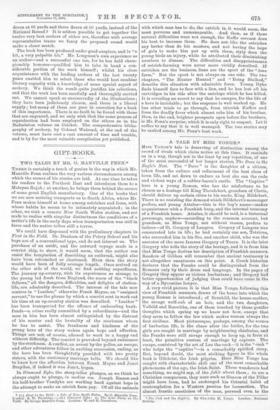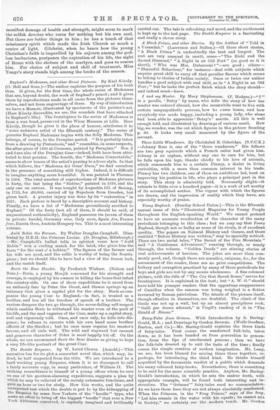A TALE BY MISS YONGE.* Miss YONGE'S tale is deserving
of distinction among the crowd of rivals which claim notice at this time. It reminds us in a way, though not in the least by any repetition, of one of the most successful of her longer stories, The Dove in the Eagle's Nest. The " Dove " is the daughter of a citizen, taken from the culture and refinement of the best class of town life, and set down to endure as best she can the rude and violent ways of a robber-baron's castle. The " Captive " here is a young Roman, who has the misfortune to be chosen as a hostage till King Theudebert, grandson of Clone, should deliver up certain cities to his uncle, King Hildebert. There is no resisting the demand which Hildebert's messenger prefers, and young Attalus—this is the boy's name—makes acquaintance with a Frankish burg, and the internal economy of a Frankish home. Attains, it should be said, is a historical personage, nephew—according to the common account, but grandson, as Miss Yonge, not without reason, prefers to believe—of St. Gregory of Langres. Gregory of Langres was consecrated late in life ; he had certainly one son, Tetricus, who succeeded him in his See, and another child, who was the ancestor of the more famous Gregory of Tours. It is the later Gregory who tells the story of the hostage, and it is from him that Miss Yonge derives her description of Frankish manners. Readers of Gibbon will remember that ancient testimony is not altogether unanimous on this point. A Greek historian declares that the Franks could be distinguished from the Romans only by their dress and language. In the pages of Gregory they appear as vicious barbarians; and Gregory had better opportunities of judging than could have come in the way of a Byzantine lawyer.
A very vivid picture it is that Miss Yonge, following this view of Frankish manners, draws of the home into which the young Roman is introduced ; of Bernhild, the house-mother, the savage wolf-cub of an heir, and the two daughters, Valhild and Roswitha, one of them touched by those gentler thoughts which spring rip we know not bow, except that they seem to follow the law which makes woman always the first civiliser. Most picturesque, perhaps, among the scenes of barbarian life, is the chase after the brides, for the two girls are sought in marriage by neighbouring chieftains, and the Franks were still savage enough to keep up, in form at least, the primitive custom of marriage by capture. The escape, contrived by the art of Leo the cook—it is the " cook " who helps the "captive "—is a remarkably spirited story. But, beyond doubt, the most striking figure in the whole book is Gilchrist, the Irish pilgrim. Here Miss Yonge has caught with characteristic skill one of the most remarkable phenomena of the age, the Irish Saint. These wanderers had something, we might say, of the fakir about them ; to use a Christian comparison, they were such as Simeon of the Pillar might have been, had he exchanged his Oriental habit of contemplation for a Western passion for locomotion. The almost frantic asceticism of the man, pursued even to the * The Cook and the Captive. By Charlotte 31. Tone. London: National Society. manifest damage of health and strength, might seem to mark the selfish devotee who cares for nothing but his own soul. But there are better things in him ; he has a touch of that missionary spirit which made the Irish Church so much a centre of light. Gilchrist, when he hears how the young Christian's faith is imperilled by his sojourn among the god- less barbarians, postpones the aspiration of his life, the sight of Rome with the shrines of the martyrs, and goes to rescue him. For choice of subject and skill of treatment, Miss Yonge's story stands high among the books of the season.



















































 Previous page
Previous page